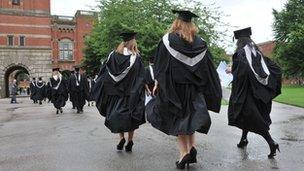'Unfair' university admissions claim
- Published

The study examined the A-level grades of students accepted at Russell Group universities
Ethnic minority students are less likely to get places at top universities than white pupils with the same A-level grades, according to research from Durham University.
Researchers looked at application data from 49,000 students from 1996 to 2006.
The study also found that state school pupils were less likely to get places than pupils from independent schools.
But a Russell Group spokeswoman said the difference could be the combination of other A-levels taken by pupils.
Education Secretary Michael Gove said that universities should provide "clear and unambiguous guidance" about the A-level subjects needed for university places.
The research by Vikki Boliver, from Durham University's School of Applied Social Sciences, examined the different outcomes for students applying for places in the Russell Group of leading universities.
Making the grade
Using data from the Ucas admissions service, the study found that white pupils and those at independent schools were more likely to be successful in their applications than black, Asian and state school pupils with the same A-level grades.
"The headline conclusion of the analysis is that access to Russell Group universities is far from 'fair'," said Dr Boliver in her report, which is to be presented at a Higher Education Academy conference on Tuesday.
The study found that there were different patterns of under-representation for different groups of applicants.
State school pupils "need to be better qualified than their private school counterparts on average by as much as two A-level grades before they are as likely to apply to Russell Group universities", the researchers found.
"And when those from state schools do apply to Russell Group universities they seem to need to be better qualified than their private school counterparts on average by as much as one grade at A-level before they are as likely to receive offers of admission."
For black and Asian applicants, the study says the barrier appeared to be in the admissions process. They were confident enough to apply to Russell Group universities, but were less likely to be offered places than similarly qualified white students.
This analysis of Ucas data cannot show why there should be a different pattern of acceptances for different groups - and Dr Boliver said there was a need to look "more deeply" into what was happening.
"This is something that cannot be ignored. We just know there is a problem, we need to know the causes."
Predicted results
Dr Boliver says it might reflect that the applications process uses predicted grades rather than actual A-level results.
The last major government study of fair access, carried out by Steven Schwartz, concluded that an application system based on predicted grades provided an unfair advantage to better-off pupils.
There were subsequent plans to introduce an admissions system based on actual A-level grades - a so-called post-qualifications applications system - but this was abandoned last year.
The Russell Group suggests there could be other factors influencing the different outcomes.
Although A-level grades between two applicants might appear to be the same - such as grades AAB - this does not show the range of subjects they have taken.
For a subject such as economics, applicants might have an A grade in A-level economics, but some universities might also require pupils to have a high grade at maths A-level as well. Without maths as an accompanying A-level the application will be less likely to succeed.
Another factor, suggests a spokeswoman for the Russell Group, is that applications from ethnic minority pupils are disproportionately focused on some of the most over-subscribed and competitive courses, such as medicine.
Wendy Piatt, director general of the Russell Group, said there was no complacency about the admissions process - but the problem reflected a lack of advice from some schools.
"Sadly many good students are simply not getting the right advice and guidance on which advanced-level subjects will qualify them for their chosen course," said Dr Piatt.
"Neither we nor the researchers can control for individual students making poor A-level choices which lead them to fail to meet entry requirements.
"Many good students simply haven't done the subjects needed for entry - universities need students not only to have good grades, but grades in the right subjects for the course they want to apply for."
The span of the study - from 1996 to 2006 - covered the introduction of tuition fees and the raising of fees to £3,000 per year. But there were no clear signs of an impact on admissions and patterns of applications from these fees.
Dr Boliver has added a further update to this research - looking at 2010 to 2012 - but this continued to show a disadvantage for ethnic minority applicants.
However this later data showed that, even though independent school pupils were still more likely to be offered a place than similarly-qualified state school pupils, the gap was narrowing.
Education Secretary Michael Gove said that the problem was not "elitism or snobbery" but a lack of honesty in higher education about "the subject and qualification choices which prepare students best for university study".
He said that independent schools often had the knowledge and connections to "play the system while state school students lose out".
- Published9 May 2011